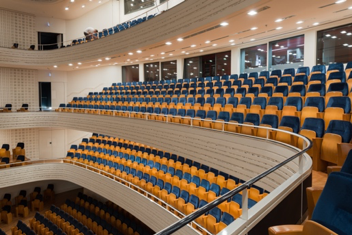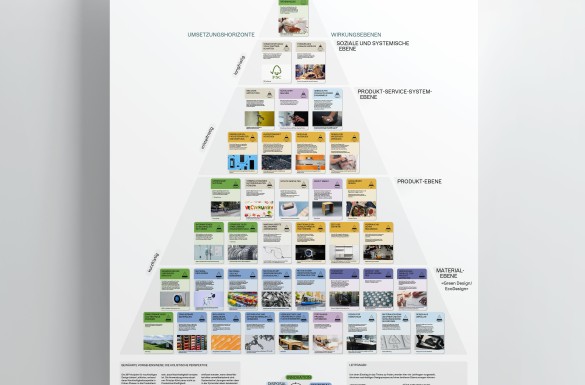INTERVIEW WITH DAVIDE MASTRODOMENICO
Remanufacturing as a successful business model at Girsberger
Remanufacturing is gaining increasing attention among companies looking for more sustainable production methods and seeking to build higher resilience to increased energy and commodity prices and bottlenecks in the supply chain.
In the interview with Milani, Davide Mastrodomenico, Head of Remanufacturing, explains how remanufacturing works and how it has been a great business success for the Swiss furniture manufacturer Girsberger.
Girsberger Remanufacturing was awarded the German Sustainability Award 2023.
Girsberger is one of the pioneers in Switzerland that offers remanufacturing of furniture in the B2B sector. In addition, you have just won the German Sustainability Award 2023.
Could you explain how remanufacturing works?
Davide Mastrodomenico: Remanufacturing is a partly manual, partly industrial process in which an existing product is dismantled into its individual parts. Then, the defective parts are repaired, reassembled and returned to the market in its original or even optimized function - with the same or better quality standard.
At Girsberger, this means that, together with the client or architect, we assess the furniture in a specific project and analyze whether it is worthwhile to repair the furniture or whether it would be better to purchase new furniture instead.
Remanufacturing is already being used in a wide variety of industries, such as transportation, energy, medical technology and manufacturing. You distinguish different remanufacturing models. One well-known form of remanufacturing is when a company is rebuilding its own products. Caterpillar, for example, practices remanufacturing with its construction machinery. This is very interesting from an economic point of view.
Another model of remanufacturing is when a company rebuilds products from other manufacturers, whose materials and design are unfamiliar. This model is more challenging, but just as economically interesting. This is exactly what Girsberger offers.
Can you explain Girsberger started offering remanufacturing services?
DM: In the past, customers who had purchased furniture from Girsberger approached us repeatedly with repair requests, after years of usage. New upholstery, covers or, for example, the revision of mechanisms became due. Gradually, we also observed that customers developed a greater need to refurbish furniture worth preserving. We were then asked more and more frequently whether we could repair products made from other manufacturers.
In 2006, Remanufacturing was established as an independent business unit at Girsberger. Today, we offer remanufacturing as a service, even for products produced by other manufacturers. There is clearly a need for this service that other companies cannot or do not want to offer for production-related reasons. Mainly, this is due to a lack of in-house expertise, or due to profitability aspects. Girsberger embarked on this path with the conviction that sustainable thinking and action must not only be challenge at a personal, individual level, but that is is the responsibility of every company. We therefore started offering this service. At the same time, it has developed into a highly successful business model for us!
Why are you so good at remanufacturing?
DM: Due to our existing manufacturing areas and manufactories, we are an interdisciplinary service provider and therefore have all the necessary in-house competencies to offer remanufacturing services.
Girsberger is a manufacturer for office and home furniture collections. These are produced industrially. In addition, these collections are characterized by a high level of craftsmanship and are manufactured in-house at our company. This includes a joinery with wood processing and wood machining, including all steps to surface treatment. Furthermore, we offer metal processing, a paint shop, upholstery development, upholstery and sewing. In addition, we have test laboratories for material and load tests. Specialists in craftsmanship, design and development are available on site and within short distances. In addition, we have network partners for special tasks and an extensive material library. Only a few furniture manufacturers have this expertise and infrastructure under one roof.
What are typical remanufacturing jobs and how do you handle such jobs?
DM: We offer remanufacturing as an interdisciplinary "all-round service". Typical tasks include the sanding of wooden frames and the associated resurfacing, as well as the renewal of upholstery and fabric or leather covers.This includes also the renewal of hinges or mechanics. Often, this involves furniture that is under preservation order or that is at least an essential part of an established interior.
A basic prerequisite for remanufacturing at Girsberger is that the furniture consists of basic substance worthy of preservation and that a certain number of pieces is requested to justify the expense. It is also important that there is a constructive structure that allows the existing parts to be taken apart.
At the beginning of the process, we offer a consultation. We analyze the needs and make a profitability calculation. Then a sample furniture is revised and based on this piece, we calculate the final offer. After order placement, the worn furniture is picked up and revised accordingly. At the end, the delivery takes place. In addition, we provide replacement furniture if needed.


Girsberger carries out a wide array of remanufacturing projects. Well-known examples include the refurbishment of concert seating at the KKL in Lucerne, seating furniture at the Escale retirement and nursing home in La Chaux-de-Fonds, or at the reknown Baur au Lac hotel in Zurich.
Why do customers come to you for remanufacturing?
DM: The reasons are manifold. They range from historic preservation requirements, to aesthetic and ergonomic quality, to clear cost savings and sustainability aspects.
There are very emotional and at the same time pragmatic reasons: Our customers want to preserve their cherished and still valuable furniture - at a price that is below the price of a new purchase.
In addition, there is an indispensable need to conserve natural resources and increasing public awareness about the benefits of circular economy.
What are the economic advantages of remanufacturing?
DM: In general, we can say that by remanufacturing valuable furniture, we can save up up to 50% of costs, compared to a new purchase. The prerequisite is a certain minimum number of pieces.
On one hand, remanufacturing is good for budget. On the other hand, remanufacturing is good in regard to the circular economy and the ecological responsibility of our clients. In remanufacturing, we use fewer natural resources, less energy and generate less waste compared to new manufacturing processes, while offering a quality standard that is equal to the original product or even better thanks to new product properties.
By remanufacturing valuable furniture, we can save up up to 50% of the cost, compared to a new purchase.
– Davide Mastrodomenico, Head of Remanufacturing, Girsberger
What were the challenges in implementing remanufacturing in the beginning and what are your current challenges?
DM: Our business area has developed quite naturally, mainly because we already had most of the required competencies for remanufacturing in-house. In this respect, our challenges mainly relate to implementing the client orders in very tight time frames and orchestrating the work steps accordingly. This also includes finding and calling in experts for special tasks. Thus, we are challenged by the widespread shortage of skilled workers.
What would you recommend to other companies in other industries that want to implement remanufacturing?
DM: Many of today's manufacturing companies have relocated production processes and the associated competencies to distant countries. Products are often no longer designed with repairability in mind, i.e. they are not made of durable materials, cannot be dismantled into their individual parts, and cannot be supplemented with new parts. A rethinking of production would therefore be an important step towards repairability and remanufacturing - assuming the necessary skills are available in-house.
A rethinking of production would therefore be an important step towards repairability and remanufacturing - assuming the necessary skills are available in-house.
– Davide Mastrodomenico, Head of Remanufacturing, Girsberger
Can you give a bit of insight into where your remanufacturing and sustainability journey is going? What do you plan to tackle next?
DM: In addition to manufacturing, upcycling is an important new field. In upcycling, you use parts or resources from existing, usually out-of-fashion, worn-out furniture and reuse them in a completely new context. Many companies have entire arsenals of old furniture or furnishing elements such as shelves, carcasses or tables. If these are disassembled and useful new elements are made from them, they can be given a new lease of life in combination with new parts, with new surfaces and new use concepts. We would like to become a pioneer in this area too!
To list all the sustainability measures at Girsberger would go beyond the scope of this article. We have been CO2-neutral since 2015, have our own solar power systems and use our wood waste for energy generation. Furthermore, in addition to general resource conservation, there are many other measures, which you can discover in our regularly published sustainability report.
Speaking for Girsberger, we are constantly working on new sustainability goals - which are redefined every year. In addition to energy-related topics, we are working to integrate new elements from renewable raw materials and sensible recyclates.
More about Milani's blog
Milani is a leading Swiss innovation and product design agency with a focus on sustainability.
On our blog, we share knowledge and best practices on design and innovation for sustainability and offer for pioneers to tell their story.
Stay up to date here! https://milani.ch/en/blog/


